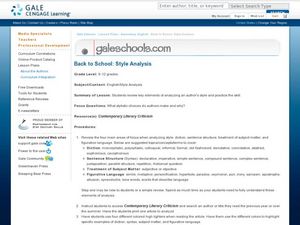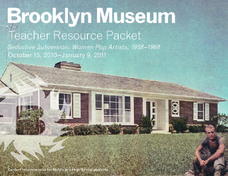Syracuse City School District
Reading Comprehension Unit Plan
A unit plan uses short texts to teach literary elements such as theme and characterization. Included are passages by authors such as Walter Dean Myers and Sandra Cisneros. Activities include quick writes, filling in graphic organizers,...
Scholastic
Hold the Presses!: Revising for Connotation
Middle schoolers discuss the meaning of the sentence, The student asked to go to the office." Ask the class if the sentence gives the reader any information about the student. Can they visualize the way the student asked the question?...
Southern Nevada Regional Professional Development Program
Reading Literature - The Ruin
Cross-comparison, the technique of focusing on two different texts with the same themes, motifs, events, etc., is employed in an exercise that asks groups to examine two different translations of “The Ruin,” a poem, written in Old...
Curriculum Corner
7th Grade ELA Common Core Checklists
Track your class's progress on all of the ELA Common Core standards with these handy charts. Along the left side, each seventh grade identifier is listed along with the full text of the standard. As you teach, reteach, assess, and...
Curated OER
Phineas Gage: Questioning Strategy
Focus on chapter two of Phineas Gage: A Gruesome but True Story About Brain Science with a questioning activity. After teaching and modeling several types of questions, learners work with partners and then independently to answer and...
Curated OER
Going Great Guns?
Working with a partner, middle and high schoolers complete a variety of activities associated with types of guns. They list different phrases and connotations that include the word "gun" in them.
Curated OER
Easily Confused Wrods: Insight and Incite
In this easily confused words: insight and incite worksheet, students read definitions and examples of both words, then interactively answer 4 questions as a test with immediate online feedback.
The New York Times
Big Brother vs. Little Brother: Updating Orwell's 1984
Government surveillance is an enduring conflict that has become increasingly complex with our nation's use of technology. Add to the understanding of Orwell’s 1984 by using the resources here that display the contemporary actions of Big...
Curated OER
Back to School: Style Analysis
Jump back into expository writing and analysis at the start of a new school year! Start with a review of an authors' stylistic choices in diction, syntax, treatment of subject matter, and figurative language. Writers choose a text to...
Curated OER
What Are the Advantages and Disadvantages of Conforming?
Dive into Arthur Miller’s The Crucible and determine what it means to conform in society, and discuss as a group with the thoughts and plans available in these documents. Included are multiple activities and brain targets that form the...
Curated OER
Poetic Elements
Poetry is all about sound and rhythm. The sound of the words, the rhythm of the lines, and the emotional atmosphere created by these elements and the literary devices poets use, compress whole stories into a few stanzas. The specialized...
Curated OER
Language and Dialect
Practice listening skills while studying oral story tellers from different parts of Louisiana. Consider the regional dialects and insider language of folk groups with your class. Identify language as part of folk life and recognize that...
Brooklyn Museum
Seductive Subversion: Women Pop Artists, 1958–1968
What role did women play in pop art during the 1950s and 1960s? The class researches the role of women in mid-century America and how those roles were portrayed through the pop art of the time. They use an excellent set of guiding...
Curated OER
What's So Bad or Good About Conflict?
Learners of all ages discuss how conflict can be negative and positive. First, they create a class bulletin board about conflict, and provide their thoughts and connotations surrounding the word. In a class discussion, they ask questions...
Southern Nevada Regional Professional Development Program
Common Core Reading Standards: Understanding Argument
What does your class know about logical fallacies? They can find out quite a bit and practice identifying logical fallacies if you follow the steps and use the resources provided here! After reviewing ethos, pathos, and logos, ask small...
Curated OER
Picture Match
Students match pictures with words that have specific phonics connotations. In this picture matching lesson plan, students have groups of words with the same phonics sayings.
Texas Education Agency (TEA)
Byzantine Architecture
View Byzantine architecture from the comfort of your classroom. A PowerPoint presentation introduces important vocabulary terms and examples of Byzantine architecture in the ninth lesson of the 11-part series. A Jeopardy game reviews...
Dr. Seuss Enterprises
Dr. Seuss in the Classroom
Explore the works of Dr. Seuss, such as Horton Hears a Who, Horton Hatches and Egg, The Sneetches and Other Stories, The Lorax, The Butter Battle Book, and Yertle the Turtle and Other Stories. Each story lesson includes reading...
Prestwick House
Teaching Shakespeare: Sonnet 73
It's that time of year to consider how Shakespeare selects his images and structures his Sonnet 73 to develop the meaning of the poem. Class members examine the rhyme scheme, the indented lines, the conceit, and the images used in each...
Curated OER
What Do You Call Older People?
Students brainstorm a list of words they use to refer to the elderly. As a class, they discuss the importance of word connotations and explain those used to refer to the older population. They complete a handout and share their thoughts...
Curated OER
Developing Students' Vocabulary Range for Describing People
Learners develop vocabulary for describing people.
Curated OER
Archaeological Study
Students analyze the difference between archaeology and anthropology while studying the evolution of different products. For this archaeology and anthropology lesson, students trace the progression of a certain tool or product and come...
Curated OER
Age and Discrimination
Middle schoolers construct a class spider diagram with the word KIDS in the middle and with associated words connected to it. They do the same with the words teenagers, middle-aged and old. In pairs, list POSITIVE words and NEGATIVE...
Curated OER
Stylistic Aspects of Composition
Students explore verbs. They list and demonstrate verbs. Students discuss words that connote different meanings. They write paragraphs based on their word selection. Students share their paragraphs with the class.

























